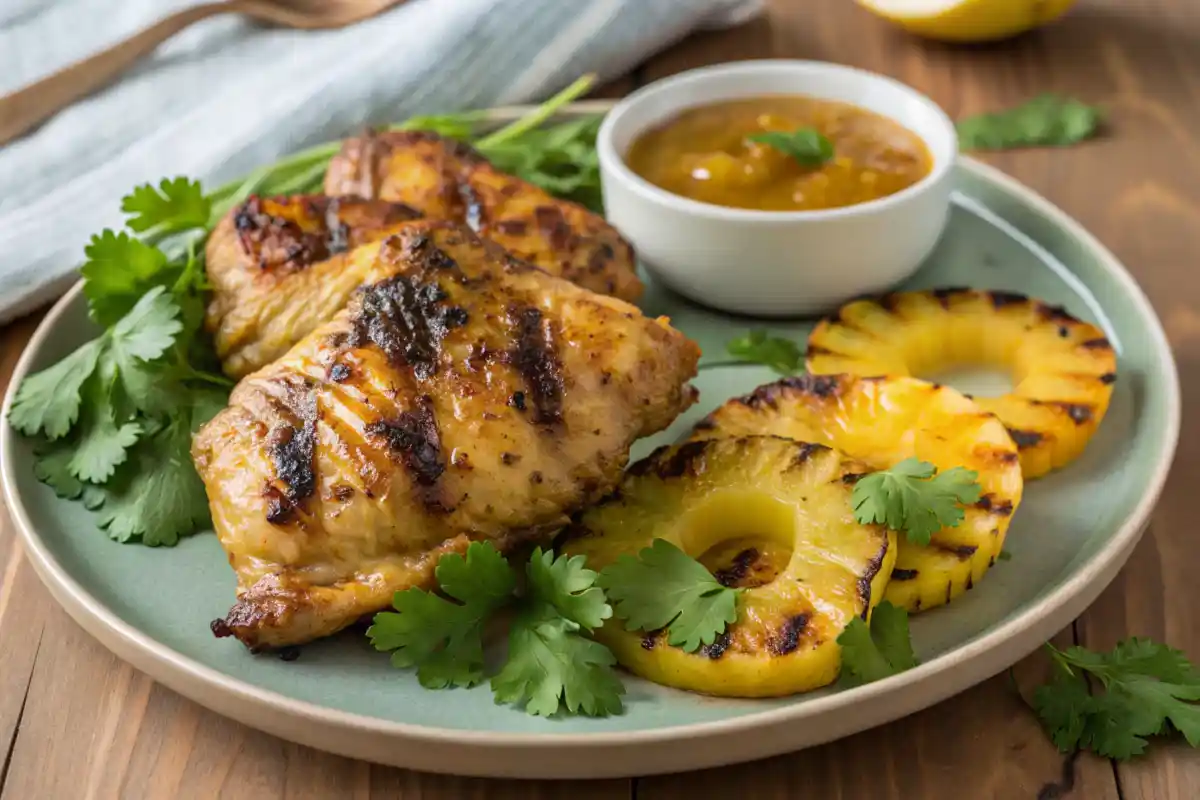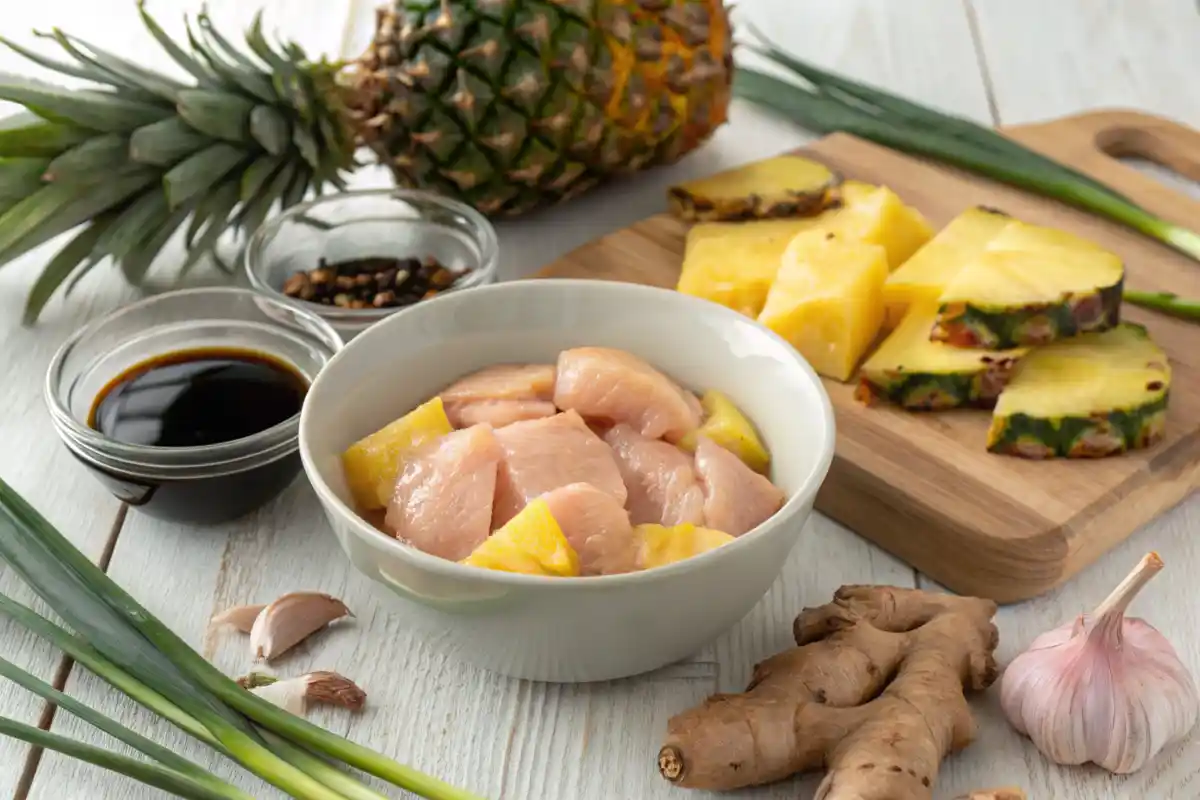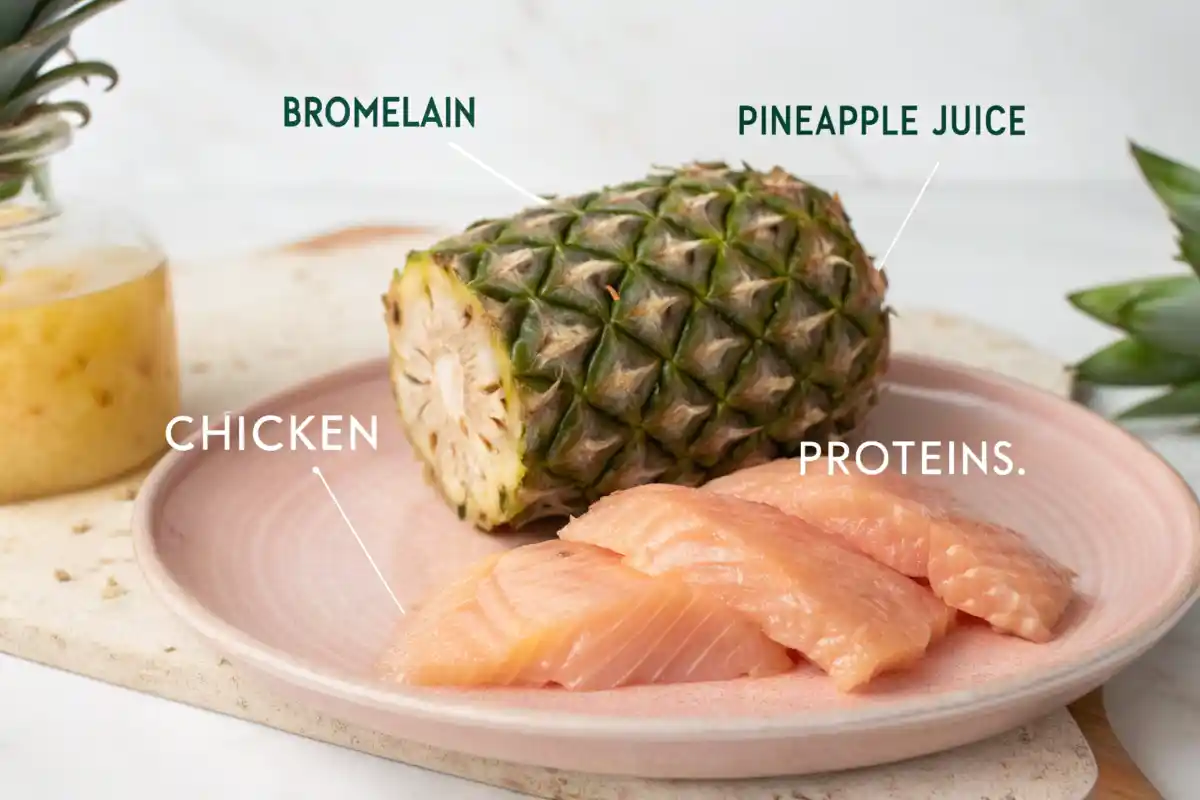Pineapple juice, with its sweet-tangy taste and natural enzymes, has carved a unique spot in kitchens worldwide. But did you know it’s more than just a tropical beverage? This article dives deep into the science, benefits, and risks of using pineapple juice as a meat tenderizer—specifically, for chicken. From understanding how its enzymes work to exploring popular recipes and alternative methods, you’ll discover everything about this tropical marvel. Whether you’re looking to enhance your next barbecue or experiment with flavors in the kitchen, this guide will show you how pineapple juice transforms chicken into a juicy, flavorful masterpiece.
Introduction to Pineapple Juice and Chicken
What Makes Pineapple Juice Special?
Pineapple juice is no ordinary ingredient; it’s a powerhouse of nutrients and enzymes that can elevate your cooking game. The magic lies in an enzyme called bromelain, found abundantly in fresh pineapple and its juice. Bromelain’s unique ability to break down proteins makes it a natural meat tenderizer, loved by chefs and home cooks alike. Plus, pineapple juice doesn’t just tenderize—it infuses the meat with a subtle sweetness and tropical flair that’s hard to beat.
Beyond its culinary uses, pineapple juice is packed with vitamins like C and B6, along with minerals such as manganese. It’s a healthy choice that adds flavor while contributing to a well-rounded diet. These qualities make it a go-to ingredient for marinades, especially for chicken, which pairs perfectly with pineapple’s zesty notes.
The History of Using Pineapple in Cooking
Pineapple’s role in cooking has a rich history. Native to South America, this tropical fruit was prized for its sweetness and health benefits. When it spread to other parts of the world, cooks discovered its tenderizing properties. Indigenous cultures often paired pineapple with meats to create tender, flavorful dishes—a tradition still alive in many tropical cuisines.
In modern cooking, pineapple juice has become a kitchen staple, celebrated for its versatility. Whether used in grilling, baking, or slow cooking, it enhances chicken dishes with its tangy sweetness. From Hawaiian grilled chicken to Caribbean stews, pineapple’s culinary legacy continues to inspire global recipes.
Why Chicken? A Perfect Pairing with Pineapple
Chicken’s mild flavor and lean texture make it an ideal canvas for bold ingredients, and pineapple juice is no exception. The juice’s natural acidity complements chicken, balancing its savory profile with a hint of tartness. Moreover, chicken’s structure benefits significantly from bromelain’s tenderizing effect, transforming even the toughest cuts into juicy, melt-in-your-mouth bites.
Chicken and pineapple are also a match made in health heaven. While chicken is a lean source of protein, pineapple juice brings antioxidants and digestive enzymes to the table. Together, they create meals that are not just delicious but also nutritious. Whether you’re marinating chicken wings or glazing a roasted bird, pineapple juice promises to elevate your dish to the next level.
The Science Behind Pineapple Juice and Meat Tenderization
What is Bromelain? The Key Enzyme in Pineapple
When it comes to tenderizing chicken, bromelain is the star of the show. This natural enzyme, found in fresh pineapple and its juice, has the unique ability to break down proteins in meat. But how does it work? Bromelain targets the peptide bonds in protein molecules, which are responsible for holding muscle fibers together. By breaking these bonds, the enzyme softens the meat, creating a tender texture that’s perfect for cooking.
This process answers the question: What does pineapple juice do to chicken? In simple terms, it makes chicken easier to chew, more flavorful, and incredibly juicy. However, bromelain isn’t just good for chicken. It can work its magic on beef, pork, and even seafood, making it a versatile tool in the kitchen.
How Bromelain Breaks Down Chicken Proteins
When you marinate chicken in pineapple juice, bromelain penetrates the meat. It starts by breaking down tough connective tissues and muscle fibers, which can sometimes make chicken feel chewy or dry. This enzymatic action improves the chicken’s tenderness and allows other flavors from the marinade—like soy sauce or spices—to seep deeper into the meat.
But here’s a catch: bromelain works fast! If you leave the chicken in pineapple juice for too long, the breakdown can go overboard, turning your chicken into a mushy mess. That’s why timing is everything when using pineapple juice to tenderize meat.
Comparing Pineapple Juice to Other Natural Tenderizers
While pineapple juice is a top choice for tenderizing chicken, it’s not the only natural option. Kiwi, papaya, and even yogurt contain enzymes or acids that work in a similar way. Kiwi has actinidin, while papaya boasts papain—both effective at breaking down meat fibers. On the other hand, yogurt uses mild acids to tenderize, adding creaminess to the flavor profile.
Still, pineapple juice stands out for its balance of acidity, sweetness, and effectiveness. Plus, the tropical hint it adds to chicken dishes is hard to replicate with other tenderizers. This combination of flavor and function makes pineapple juice a go-to ingredient in kitchens around the globe.
How to Use Pineapple Juice to Tenderize Chicken
Best Practices for Marinating Chicken with Pineapple Juice
If you’re wondering how to tenderize chicken effectively, pineapple juice is one of the simplest and most flavorful methods. Begin by preparing a marinade with fresh pineapple juice—canned juice may not work as well due to added preservatives or reduced enzyme levels. Combine it with complementary ingredients like soy sauce, garlic, or ginger to balance the flavors.
What does pineapple juice do to chicken during marination? It enhances both texture and taste, but timing is key. For best results, marinate your chicken for 30 minutes to 1 hour. Any longer, and the chicken may turn overly soft. Also, ensure the juice coats the meat evenly for consistent tenderizing.
Time Limits: How Long is Too Long?
The effectiveness of pineapple juice lies in its enzymatic action, which works rapidly. While marinating chicken for 30 minutes can yield tender and flavorful results, letting it sit for hours might ruin the texture. If you’re aiming for precision, set a timer and don’t exceed the recommended time.
For thicker cuts, such as chicken breasts, aim for 1 hour. Thinner pieces like thighs or drumsticks need even less time—20 to 30 minutes is often enough. This balance ensures you get tender, juicy chicken without it becoming mushy.
Fresh vs. Canned Pineapple Juice: Which Works Better?
When it comes to tenderizing chicken, fresh pineapple juice reigns supreme. Why? Fresh juice contains active bromelain enzymes that work wonders on chicken. Canned pineapple juice, however, often undergoes heat processing, which deactivates bromelain. As a result, its tenderizing power is significantly reduced.
So, if you want your chicken to turn out perfectly tender, always choose fresh pineapple juice. Not only will you benefit from the full enzymatic effects, but the flavor is also brighter and more natural compared to canned alternatives.
Benefits of Using Pineapple Juice for Chicken
Enhanced Tenderness and Juiciness
One of the standout benefits of using pineapple juice on chicken is its ability to create an incredibly tender and juicy texture. Thanks to bromelain, the natural enzyme in pineapple, the tough connective tissues in chicken break down effortlessly. As a result, each bite feels succulent and flavorful. If you’ve ever wondered, what does pineapple juice do to chicken, the answer lies in this transformative effect that elevates the overall dining experience.
Additionally, pineapple juice not only tenderizes but also locks in moisture, preventing the chicken from drying out during cooking. This makes it an excellent choice for grilling, baking, or even slow cooking. Whether you’re preparing a summer barbecue or a hearty dinner, pineapple juice ensures your chicken is cooked to perfection every time.
Added Sweet and Tangy Flavor Profile
Apart from tenderizing, pineapple juice imparts a delightful sweet and tangy flavor to chicken. Its natural sugars caramelize beautifully during cooking, adding a subtle complexity to the dish. The bright, tropical notes of pineapple perfectly complement chicken’s mild flavor, creating a harmonious blend of tastes.
For dishes like Hawaiian grilled chicken or pineapple-glazed drumsticks, this fruity zing takes center stage. Even in savory marinades, pineapple juice acts as a balancing agent, enhancing the flavors of soy sauce, garlic, and ginger while providing a refreshing finish.
Natural and Chemical-Free Tenderizing Option
Unlike commercial meat tenderizers loaded with artificial chemicals, pineapple juice offers a natural and healthy alternative. It’s free from preservatives and additives, making it a safer choice for marinating chicken. Plus, its rich nutrient profile—packed with vitamin C, manganese, and antioxidants—makes it an ingredient that nourishes as it flavors.
For more tips on preparing chicken with unique marinades, you can explore recipes like smoked chicken thighs for additional inspiration.
Risks and Precautions
Avoiding Over-Tenderization and Mushiness
While pineapple juice can work wonders on chicken, its powerful bromelain enzyme can sometimes overdo the job. Marinating chicken for too long, especially more than an hour, may break down the proteins excessively, leaving the meat mushy and unappealing. To avoid this, stick to recommended marinating times—30 minutes for thinner cuts and up to an hour for thicker pieces.
Additionally, diluting pineapple juice with water or mixing it with other ingredients like oil and vinegar can temper its intensity. This ensures the chicken stays tender without losing its structure.
Allergic Reactions to Pineapple
For those with pineapple allergies or sensitivities, caution is key. Pineapple juice contains compounds that can trigger reactions like itching, swelling, or digestive discomfort in sensitive individuals. If you’re serving a dish marinated in pineapple juice, always check with guests about dietary restrictions to avoid potential issues.
Balancing Flavors: Ensuring the Dish Isn’t Overpowered
Pineapple juice has a bold flavor that can dominate a dish if not balanced properly. To avoid this, pair it with savory ingredients like soy sauce, garlic, or spices. These additions mellow the sweetness and create a well-rounded marinade. Also, using fresh pineapple juice instead of canned ensures a more natural taste without the excessive sweetness from added sugars.
For more delicious recipes using bold flavors, check out pineapple casserole recipes for a twist on tropical cuisine.
Recipes Featuring Pineapple Juice and Chicken
Hawaiian Grilled Chicken with Pineapple Marinade
Nothing screams tropical flavors like Hawaiian grilled chicken. This recipe brings together the magic of pineapple juice, soy sauce, garlic, and ginger to create a marinade bursting with sweet and savory notes. The bromelain in the pineapple juice not only tenderizes the chicken but also infuses it with a tangy zing. Grill the marinated chicken until it’s golden and slightly caramelized for a dish that’s perfect for summer cookouts.
Pair it with grilled pineapple rings for a full-on tropical experience. And if you’re curious about what does pineapple juice do to chicken, this recipe showcases its tenderizing and flavor-enhancing properties at their best.
Slow-Cooked Pineapple Chicken
For a comforting and easy dinner, slow-cooked pineapple chicken is a must-try. Combine chicken thighs or drumsticks with pineapple juice, brown sugar, soy sauce, and a touch of chili for heat. Let the slow cooker work its magic over a few hours, and you’ll have tender, juicy chicken falling off the bone.
The slow cooking allows the enzymes in the pineapple juice to break down the proteins gently while melding flavors into a rich, tangy sauce. Serve this over steamed rice or noodles for a satisfying meal.
Pineapple-Glazed Chicken Wings
Pineapple-glazed chicken wings are the ultimate game-day snack. The glaze, made with pineapple juice, honey, soy sauce, and a dash of sriracha, creates the perfect balance of sweet, spicy, and tangy. After baking or air-frying the wings, toss them in the sticky glaze for a crowd-pleasing appetizer.
This dish is another answer to what does pineapple juice do to chicken—it enhances both the texture and flavor, making these wings irresistible.
Pineapple Chicken Stir-Fry
For a quick and healthy option, try a pineapple chicken stir-fry. Sauté bite-sized chicken pieces marinated in pineapple juice with bell peppers, snap peas, and onions. The natural acidity of pineapple juice helps tenderize the chicken quickly while adding a bright, fresh taste to the dish.
Toss in chunks of fresh pineapple for added sweetness, and serve over jasmine rice for a light yet flavorful meal.
Alternative Methods for Tenderizing Chicken
Using Yogurt and Buttermilk for Tenderization
While pineapple juice is excellent, yogurt and buttermilk offer a milder way to tenderize chicken. Both contain natural acids and enzymes that gently break down proteins, making them ideal for delicate recipes. Yogurt-based marinades, common in Mediterranean and Indian cooking, not only tenderize but also add creaminess and subtle tang.
Papaya and Kiwi as Enzyme Alternatives
Kiwi offers actinidin, which works in a similar way to soften muscle fibers. These fruits provide excellent alternatives for those who want to experiment with tenderizing methods while minimizing the risk of over-softening.
Physical Tenderizing Methods
For a no-marinade option, try using a meat mallet to physically tenderize chicken. By pounding the meat, you break down muscle fibers manually, ensuring it cooks evenly and remains juicy. This method is especially effective for recipes like chicken cutlets or schnitzel.
For more inspiration on tenderizing and enhancing chicken recipes, check out smoked chicken chest recipes for ideas that pair well with natural techniques.
FAQs Based on Popular Questions
How Does Pineapple Juice Tenderize Chicken?
Pineapple juice tenderizes chicken through the action of bromelain, a natural enzyme that breaks down proteins. When used in a marinade, this enzyme targets the muscle fibers and connective tissues in chicken, softening them and making the meat more tender. If you’ve been asking yourself, what does pineapple juice do to chicken, the answer is simple: it enhances texture while adding a hint of tropical flavor.
What Are the Risks of Over-Marination?
While pineapple juice is effective, it can over-tenderize chicken if left for too long. Marinating for more than an hour can cause the meat to become mushy. To avoid this, stick to recommended marinating times—about 30 minutes for thinner cuts and no more than an hour for thicker pieces.
How Long Should Chicken Be Marinated with Pineapple Juice?
The ideal marination time depends on the cut of chicken. Smaller or thinner pieces, such as tenders or thighs, need just 20 to 30 minutes. Larger cuts like breasts can benefit from up to an hour. Over-marinating is a common mistake, so timing is crucial to get the best results.
Can Pineapple Juice Be Used for Other Meats?
Yes! While chicken is the most common choice, pineapple juice also works wonders on tougher meats like beef and pork. The bromelain in pineapple juice breaks down proteins in the same way, making it versatile for various recipes.
What Are the Best Pineapple Juice Substitutes?
If pineapple juice isn’t available, try kiwi or papaya for similar enzyme-based tenderizing. Yogurt, buttermilk, or citrus juices like lemon or lime can also tenderize while adding unique flavors.
Conclusion
In conclusion, pineapple juice is a game-changer when it comes to tenderizing chicken. Its natural enzyme, bromelain, breaks down proteins, enhancing both texture and flavor. By answering the question, what does pineapple juice do to chicken, we’ve uncovered its ability to transform tough cuts into juicy, tender, and flavorful dishes. From Hawaiian grilled chicken to tangy stir-fries, pineapple juice proves to be both versatile and healthy. However, timing and balance are key to preventing over-tenderization. Used correctly, this tropical ingredient elevates your meals to a whole new level of deliciousness.



